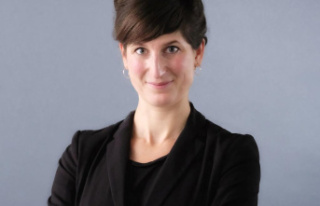There is unanimity in the celebration of the negotiated collective agreement on relief at the six university hospitals. But there could also be losers in the battle for nursing staff. A clinic manager sees a great need for reform in the healthcare system.
Essen (dpa / lnw) - After the painstakingly negotiated relief agreement for six university hospitals in North Rhine-Westphalia, the Essen university hospital director expects a significantly intensified fight for the rare nursing staff. Professor Jochen Werner praised the agreement reached with the Verdi trade union last Tuesday, saying that the agreement could be "exemplary for hospitals throughout Germany". However, as a consequence of the need to increase staff at the university clinics, he fears a "cut-out competition" with consequences for the entire German healthcare system, as Werner told the German Press Agency.
University hospitals are already comparatively well staffed. "The personnel ratios will now be even better. However, the pull will then be even stronger in the university hospitals," emphasized the chairman of the board of Essen's university medicine. "The losers are all the other hospitals on the levels below." In the end, according to Werner, there would no longer be a shortage of nurses at university clinics, "but in the smaller hospitals, in outpatient care or in geriatric care".
Essen's care director Andrea Schmidt-Rumposch already announced in the "WAZ": "We will actively recruit employees on all channels to build up staff. The agreement will make us even more attractive as an employer." Professor Edgar Schömig, head of the Cologne clinic and negotiator for the NRW university clinics, praises the "pioneering role in working conditions in patient care": "Anyone who works in a university clinic can be sure in the future that there will be no better general conditions in other hospitals, at least nationally are."
On the side of the employees, Verdi had agreed with the university hospitals in Bonn, Aachen, Cologne, Düsseldorf, Essen and Münster after a massive industrial dispute and eleven-week strikes on the cornerstones of the so-called collective agreement relief (TV-E). From January 1, 2023, this will regulate relief models for employees. Shift-specific ratios of employees and patients are defined for care and in some cases also for other areas of the clinic. If the personnel quota is then undercut, the employees receive debit points. At a certain number, these points are converted into free days. For service, IT and technology areas as well as outpatient clinics, the creation of a flat rate of 30 additional full-time positions per university hospital was agreed. There are also measures to improve the quality of training.
Katharina Wesenick, Verdi Head of Health in NRW, speaks of a "big stage victory". Politicians and the Marburger Bund NRW/Rhineland-Palatinate doctors' union also expressed their satisfaction with the solution that was achieved. At the same time, the chairman of the Marburg Association of North Rhine-Westphalia/RLP, Hans-Albert Gehle, called for collective bargaining improvements for his clientele. Politicians should not forget "that doctors who have been chronically overworked for years also urgently need improvements to their overall working conditions". Many positions in the medical field have also not been filled for years. "The shortage of doctors is an additional burden for our colleagues."
It will be exciting to see how other hospitals, including a number of church-sponsored university hospitals, position themselves. Dirk Albrecht, managing director of the Catholic hospital operator Contilia, which operates seven hospitals in the Ruhr area, referred to the independent tariff system, the so-called "third way". And the head of the German Hospital Society (DKG), Ingo Morell, suggested that the refinancing of certain areas promised by the state of North Rhine-Westphalia for the university hospitals should now apply to "all hospitals".
Either way, the collective bargaining agreement alone will not solve the nursing misery in Germany, emphasized Werner. To do this, far-reaching and long-overdue reforms in the health care system would finally have to be tackled, nationwide. "Because it's also a nationwide problem," explained Werner. "Because this shortage of skilled workers - not only in nursing, but also in other areas - is significantly related to the still too many hospitals in Germany. That's where we have the core of the problem."
Compared to other countries, you can afford “on average significantly more hospital beds per population, with comparable numbers of nursing staff, but distributed among significantly more hospitals”. Added to this is the "desolate digitization situation for over 30 years". Werner: "If we don't start planning a nationwide strategy now - and not through the back door, because more and more hospitals are getting into financial difficulties - we won't make any progress."












